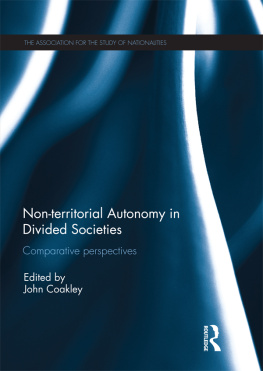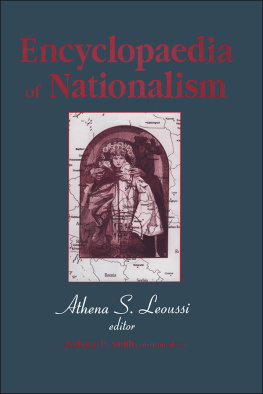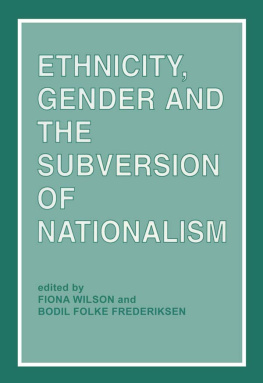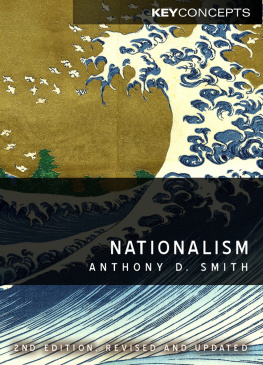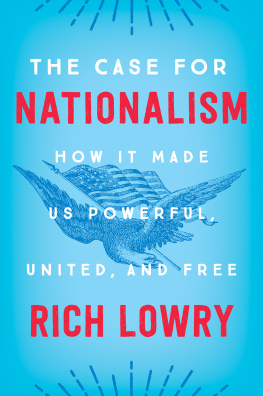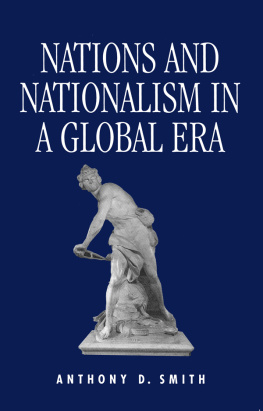John Coakley - Nationalism, Ethnicity and the State: Making and Breaking Nations
Here you can read online John Coakley - Nationalism, Ethnicity and the State: Making and Breaking Nations full text of the book (entire story) in english for free. Download pdf and epub, get meaning, cover and reviews about this ebook. year: 2012, publisher: SAGE Publications Ltd, genre: Politics. Description of the work, (preface) as well as reviews are available. Best literature library LitArk.com created for fans of good reading and offers a wide selection of genres:
Romance novel
Science fiction
Adventure
Detective
Science
History
Home and family
Prose
Art
Politics
Computer
Non-fiction
Religion
Business
Children
Humor
Choose a favorite category and find really read worthwhile books. Enjoy immersion in the world of imagination, feel the emotions of the characters or learn something new for yourself, make an fascinating discovery.

- Book:Nationalism, Ethnicity and the State: Making and Breaking Nations
- Author:
- Publisher:SAGE Publications Ltd
- Genre:
- Year:2012
- Rating:3 / 5
- Favourites:Add to favourites
- Your mark:
- 60
- 1
- 2
- 3
- 4
- 5
Nationalism, Ethnicity and the State: Making and Breaking Nations: summary, description and annotation
We offer to read an annotation, description, summary or preface (depends on what the author of the book "Nationalism, Ethnicity and the State: Making and Breaking Nations" wrote himself). If you haven't found the necessary information about the book — write in the comments, we will try to find it.
John Coakley: author's other books
Who wrote Nationalism, Ethnicity and the State: Making and Breaking Nations? Find out the surname, the name of the author of the book and a list of all author's works by series.
Nationalism, Ethnicity and the State: Making and Breaking Nations — read online for free the complete book (whole text) full work
Below is the text of the book, divided by pages. System saving the place of the last page read, allows you to conveniently read the book "Nationalism, Ethnicity and the State: Making and Breaking Nations" online for free, without having to search again every time where you left off. Put a bookmark, and you can go to the page where you finished reading at any time.
Font size:
Interval:
Bookmark:
Nationalism, Ethnicity and the State
Nationalism, Ethnicity and the State
Making and breaking nations
John Coakley


SAGE Publications Ltd
1 Olivers Yard
55 City Road
London EC1Y 1SP
SAGE Publications Inc.
2455 Teller Road
Thousand Oaks, California 91320
SAGE Publications India Pvt Ltd
B 1/I 1 Mohan Cooperative Industrial Area
Mathura Road
New Delhi 110 044
SAGE Publications Asia-Pacific Pte Ltd
3 Church Street
#10-04 Samsung Hub
Singapore 049483
Editor: Natalie Aguilera
Editorial assistant: James Piper
Production editor: Imogen Roome
Marketing manager: Sally Ransom
Cover design: Francis Kenny
Typeset by: C&M Digitals (P) Ltd, Chennai, India
Printed in India at Replika Press Pvt Ltd
John Coakley 2012
First published 2012
Apart from any fair dealing for the purposes of research or private study, or criticism or review, as permitted under the Copyright, Designs and Patents Act, 1988, this publication may be reproduced, stored or transmitted in any form, or by any means, only with the prior permission in writing of the publishers, or in the case of reprographic reproduction, in accordance with the terms of licences issued by the Copyright Licensing Agency. Enquiries concerning reproduction outside those terms should be sent to the publishers.
Cover image: annual bonfire celebrating victory of Protestant King William over Catholic King James at the Battle of the Boyne (1690), Annadale Embankment, Belfast, 11 July 2011.
Library of Congress Control Number: 2011945431
British Library Cataloguing in Publication data
A catalogue record for this book is available from the British Library
ISBN 978-1-4462-4742-6
ISBN 978-1-4462-4743-3(pbk)
The rapidly growing range of books and articles on nationalism raises the question as to why yet another book on the subject is needed. Those familiar with this vast literature, however, will be aware that, for all its extent and quality, it is overwhelmingly dominated by case studies, with theoretical analyses occupying a respectable niche, and just a tiny number of comparative works.
There have been notable efforts to synthesise the huge body of writing that has emerged in recent decades, and impressive strides have been made in the domain of sociological theories of nationalism. Nevertheless, this still leaves a gap: the need for further broad comparative study of this powerful force. The present book tries to respond to this need, though necessarily subject to two important restrictions. First, this multi-faceted phenomenon clearly requires interdisciplinary analysis; but the present study reflects the perspective of the political scientist. Second, the reach of nationalism is global; but few scholars can claim familiarity with all zones of the world, and the European bias of this book must be acknowledged.
The book seeks, then, to offer an overview of nationalism characterised by a comparative historical approach that combines an attempt to synthesise the existing literature on the concomitants of nationalism with theoretical speculation regarding the path that it typically follows. The book rests on analysis of a large number of case studies of very different kinds, an approach that relies on the generous assistance of many people and institutions.
I would like in the first place to record my gratitude to the many libraries in which it was my privilege and pleasure to work. The libraries of University College Dublin and Queens University Belfast have been of particular assistance, but it has been a rewarding experience to work also in so many other university libraries (with that of the London School of Economics as the richest in resources in this area) and national libraries (with the National Library of Ireland and the British Library as those on which I have relied most). The eccentricities of national library culture are, indeed, almost as intriguing as nationalism itself, with only experienced practitioners having the capacity to penetrate unwritten norms to ensure that books are not only ordered but are likely to be delivered. The extremes are represented by the openness of the Library of Congress system (sadly limited in recent years by security considerations) and the eccentric and often frustrating unpredictability of the old German Staatsbibliothek in East Berlin and its unique relationship with its West Berlin counterpart during the years of the cold war.
The gigantic expansion in availability of data that was ushered in by the information technology revolution makes it necessary also to acknowledge the invaluable assistance of other institutions. These include national statistical databases (notably, central statistics offices), but also, in particular, data archives which have made important datasets available. Among these, I am grateful to ARK-Northern Ireland Life and Times Survey, Centro de Investigaciones Sociolgicas in Madrid, DANS in the Netherlands, GESIS Leibniz Institute for the Social Sciences in Germany, the Inter-University Consortium for Political and Social Research at the University of Michigan, the Irish Social Science Data Archive at University College Dublin, the Norwegian Social Science Data Services at the University of Bergen (for the European Social Survey), Rseau Quetelet in Paris, the United Kingdom Data Archive at the University of Essex, and the World Values Survey network.
My thanks are due also to the several institutions that have hosted sabbatical visits over the years, including the Free University of Berlin, the Fondation Nationale des Sciences Politiques in Paris, the University of Helsinki, the Woodrow Wilson Center in Washington, DC, and Australian National University. Warm thanks are due to friends and colleagues who read one or more chapters of the book or assisted in other ways: Stefan Auer, Joe Brady, Steve Bruce, Linda Cardinal, Walker Connor, John Edwards, Bryan Fanning, Yvonne Galligan, Tom Garvin, Adrian Guelke, Katy Hayward, Michael Holmes, Iseult Honohan, Derek Hutcheson, Jean Laponce, Wolfgang Marx, Stephen Mennell, Gerald Mills, Brendan OLeary, Pascal Pragnere, Joe Ruane, Claudia Saba, Bill Safran and Tobias Theiler. I am particularly indebted to Sinia Maleevi and Jennifer Todd, who read all, or almost all, of the text. Finally, I am grateful to the staff of Sage Publications, including Natalie Aguilera, Patrick Brindle, David Mainwaring, James Piper, Imogen Roome and their colleagues, for their work at various stages in ensuring the publication of this book.
Nationalism is an infantile sickness. It is the measles of the human race this was the verdict attributed to Albert Einstein on the force that had so profound an impact on the Europe of his middle years (Dukas and Hoffman, 1979: 38). This judgement of a theoretical physicist briefly turned political commentator was, if anything, milder than the assessments of later analysts of nationalism, many of whom would have used the metaphor of a much more deadly disease than measles. One distinguished scholar alleged that it has created new conflict, exacerbated tensions, and brought catastrophe to numberless people innocent of all politics (Kedourie, 1993: 134). Others have pointed to its potential for generating hatred, civil unrest, violence, war and political instability (Kellas, 1998: 1112; Poole, 1999: 9; Joireman, 2003: 1). There is, however, agreement on its huge importance in contemporary societies, with Greenfeld (1992: 3) seeing nationalism at the basis of the world in which we live, Hechter (2000: 3) taking the view that nationalism and its close cousin, ethnicity, currently are the most potent political forces in the world, Puri (2004: 3) seeing the crisis of September 11, 2001, in the USA as revealing the force of nationalism in various ways (in particular, through the vigour of the American popular response), and Roshwald (2006: 1) drawing attention to its pervasiveness in the post-Cold War world.
Next pageFont size:
Interval:
Bookmark:
Similar books «Nationalism, Ethnicity and the State: Making and Breaking Nations»
Look at similar books to Nationalism, Ethnicity and the State: Making and Breaking Nations. We have selected literature similar in name and meaning in the hope of providing readers with more options to find new, interesting, not yet read works.
Discussion, reviews of the book Nationalism, Ethnicity and the State: Making and Breaking Nations and just readers' own opinions. Leave your comments, write what you think about the work, its meaning or the main characters. Specify what exactly you liked and what you didn't like, and why you think so.

